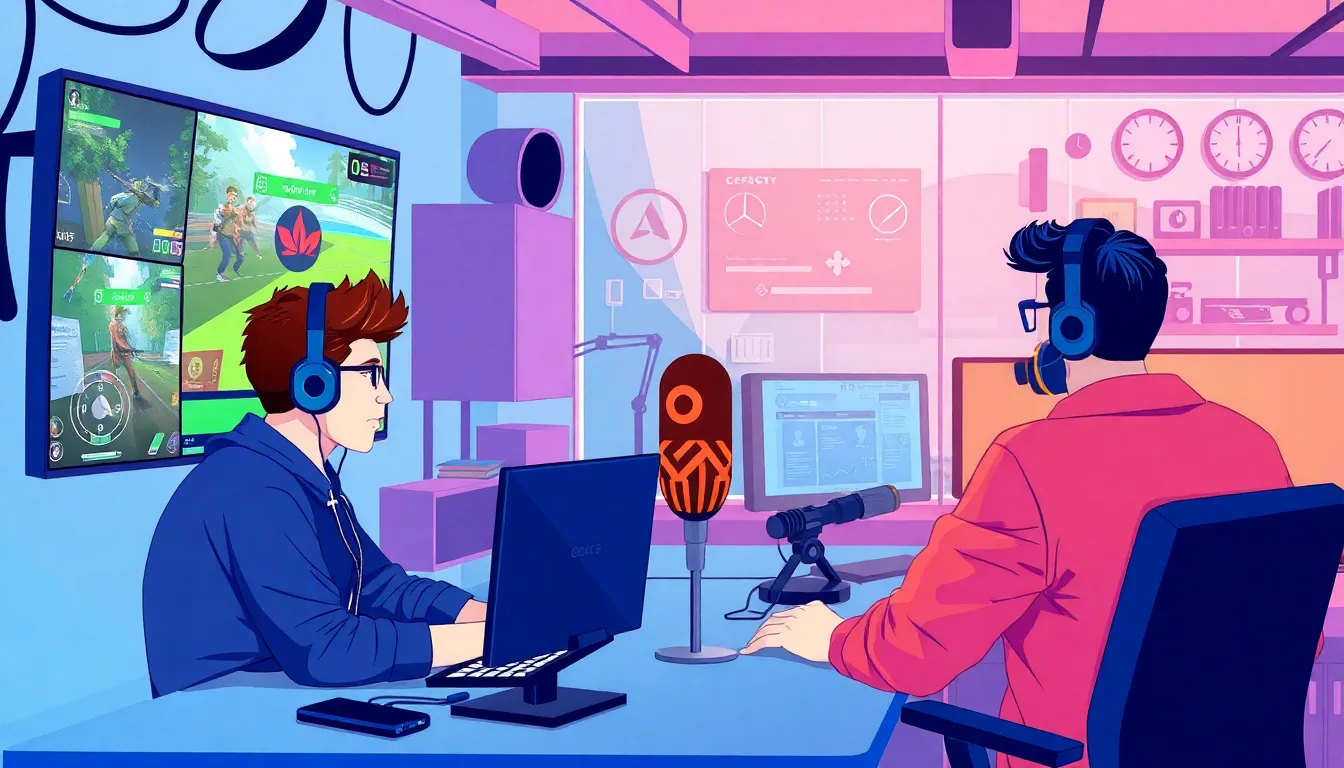In a world where gaming isn’t just for kids anymore, esports has become a booming industry, offering a treasure trove of career opportunities. Forget the days when playing video games was seen as a waste of time; now, it’s a legitimate path to success. Whether you’re a keyboard warrior, a strategy mastermind, or a social media guru, there’s a spot for you in this digital arena.
Esports Career Opportunities
Esports offers diverse career opportunities beyond just playing video games. Players focus on mastering their skills and competing at high levels in tournaments. Coaches analyze game strategies and help teams enhance performance, making coaching a critical role in the esports industry.
Content creators generate engaging media, including videos and livestreams, attracting large audiences. Game developers work on creating and enhancing games, directly impacting the gaming experience. Event organizers manage tournaments and esports events, ensuring everything runs smoothly from logistics to promotions.
Marketing specialists promote teams and brands, leveraging social media and digital marketing techniques. Analysts collect and interpret data, identifying trends and strategies that can improve teams’ performance. Community managers serve as a bridge between fans and organizations, fostering engagement and loyalty.
With the rise of esports, roles like sponsorship coordinators have emerged, focusing on building partnerships with brands. Careers in broadcasting also gain traction, as commentators and analysts provide insights during live events, enriching the viewing experience.
Technical support staff maintain gaming equipment and software, ensuring seamless gameplay. Additionally, psychologists and nutritionists offer valuable services, enhancing players’ mental and physical well-being. This multifaceted industry holds something for everyone, catering to different interests and skills.
Types Of Careers In Esports

Numerous career paths exist within the esports industry. Each path caters to various skills and interests, making the field diverse and dynamic.
Player Careers
Player careers form the backbone of esports. Competitive gamers participate in tournaments, striving for victory and recognition. Requirements include exceptional gaming skills, teamwork, and discipline. Top players often earn substantial salaries and sponsorship deals. Competing at high levels demands rigorous practice schedules and a deep understanding of game mechanics.
Coaching And Management
Coaching and management roles focus on enhancing team performance. Coaches analyze gameplay, devise strategies, and provide feedback to players. Team managers handle logistics, ensuring players are prepared for competitions. Efficient management creates a supportive environment for players to thrive. Experience in competitive gaming often benefits those in coaching and management positions.
Content Creation And Streaming
Content creation and streaming have gained significant traction in esports. Creators produce videos, live streams, and tutorials, attracting large audiences. Skills in video editing, storytelling, and social media engagement are crucial in this area. Successful streamers often build strong personal brands, leading to monetization opportunities through ads, sponsorships, and viewer donations. This career path combines creativity with a passion for gaming.
Marketing And Business Development
Marketing and business development roles are essential in the esports ecosystem. Professionals in these areas focus on promoting teams, events, and products. Strategies include social media campaigns, partnerships, and branding initiatives. Knowledge of market trends and strong communication skills enhance effectiveness. These positions drive revenue and grow the esports industry, aligning with its rapid expansion.
Skills Needed For Esports Careers
A variety of skills enhance a candidate’s prospects in esports careers. These skills cater to both players and non-players, ensuring professionals thrive across different roles.
Gaming Skills
Exceptional gaming skills serve as the foundation for many esports careers. Competitive players must excel in gameplay mechanics, strategy formulation, and adaptability under pressure. Knowledge of game dynamics proves essential, with each title requiring unique techniques and teamwork approaches. Mastery of communication tools and in-game strategies facilitates collaboration among team members, resulting in cohesive gameplay. Additionally, practicing regularly sharpens reflexes and decision-making abilities, crucial in high-stakes matches.
Communication And Teamwork
Effective communication and teamwork are essential for esports professionals. Players need to convey strategies instantly and clearly, fostering collaboration during matches. Coaches and managers also thrive on strong communication, ensuring smooth operations. Team success often hinges on mutual support and understanding among members. Building relationships strengthens operational dynamics, enabling teams to strategize and adjust to opponents efficiently. Listening skills play a pivotal role in absorbing feedback and implementing improvements.
Marketing And Branding Knowledge
Marketing and branding knowledge significantly impacts an esports career. Professionals should grasp audience insights, ensuring targeted promotions resonate with fans. Expertise in social media platforms helps in crafting engaging content, necessary for attracting viewers and sponsors. Understanding brand partnerships leads to successful collaborations, boosting visibility and resource access. Professionals should remain aware of market trends and evolving audience preferences. Crafting a personal brand enhances visibility, emphasizing unique skills and strengths amid a competitive landscape.
How To Get Started In Esports
Starting a career in esports involves several strategic steps. Individuals must focus on building their personal brands and engaging with the esports community.
Building Your Brand
Establishing a strong personal brand is crucial in the esports landscape. Content creators can create engaging, high-quality videos or streams that showcase individual skills and personality. Players emphasize authenticity and consistency, as audiences gravitate toward genuine personalities. Leveraging social media platforms amplifies reach and connection with fans. Content sharing should include gameplay highlights, tutorials, and commentary to attract interest. Engaging with followers fosters a loyal community, which further enhances visibility and opportunities.
Networking And Community Involvement
Networking serves as a vital component in developing a successful esports career. Building relationships with other gamers, professionals, and content creators opens doors to collaborations and sponsorships. Participating in local tournaments or online communities offers personal connections with like-minded individuals. Attending esports events provides opportunities to meet industry professionals face-to-face. Engaging in discussions on social media platforms allows individuals to share insights and foster relationships with established figures in esports. Collaboration projects enhance visibility and demonstrate skills to a broader audience.
Gaining Experience Through Internships
Internships provide practical experience critical for a rewarding career in esports. Aspiring professionals can seek opportunities with gaming companies, event organizers, or esports teams. Hands-on experiences allow individuals to develop essential skills, from marketing to event management. Applying for internships during or after college provides a competitive edge. Internships also help in building professional networks that may lead to job offers post-completion. Gaining insights into industry operations equips individuals with valuable knowledge and enhances employability in the esports arena.
The esports industry offers a wealth of career opportunities for those passionate about gaming. With roles ranging from players and coaches to content creators and marketing specialists, there’s something for everyone. The dynamic nature of esports continues to evolve, providing avenues for innovation and growth.
Aspiring professionals should focus on developing their skills and building a personal brand. Engaging with the community and networking can open doors to valuable connections and potential job offers. As the industry expands, the potential for a rewarding career in esports becomes increasingly attainable. Embracing this exciting landscape can lead to fulfilling experiences and success in a rapidly growing field.





